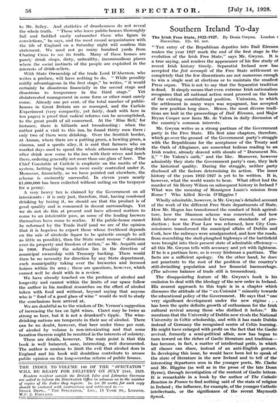Southern Ireland To-day
" THE entry of the Republican deputies into Dail Eireann makes the year 1927 mark the end of the first stage in the evolution of the Irish Free State," says Mr. Gwynn. It is a true saying, and renders the appearance of his fine study of recent Irish history timely. Separatist Ireland now has accepted the fail accompli of the Free State settlement so completely that the few dissentients are not numerous enough to win a single seat at elections or to maintain the smallest Press organ. This is not to say that the Separatist tradition is dead. It simply means that even extreme Irish nationalism recognizes that all national action must proceed on the basis of the existing constitutional position. Unionism, to which the settlement in many ways was repugnant, has accepted the new position long since. Hence, the most diverse tradi- tions are knit in the proceedings of Dail Eireann, and Major Bryan Cooper now faces Mr. de Valera in daily discussion of the country's common interests.
Mr. Gwynn writes as a strong partizan of the Government party in the Free State. His first nine chapters, therefore, which go over the ground of the Government party's struggle with the Republicans for the acceptance of the Treaty and the Oath of Allegiance, are somewhat tedious reading to an Irish reader, already deaved with shouts of " Document No. 2," " De Valera's oath," and the like. Moreover, however admirably they state the Government party's case, they lack the historical quality. During the struggle, neither party disclosed all the factors determining its action. The inner
history of the years 1922-1927 is yet to be written. It is, however, what the world wants to hear. What effect had the murder of Sir Henry Wilson on subsequent history in Ireland ? What was the meaning of Monsignor Luzio's mission from Rome ? Who killed Kevin O'Higgins ?
Wholly admirable, however, is Mr. Gwynn's detailed account of the work of the different Free State departments of State. How Mr. Hogan has transformed the conduct of Irish agricul- ture, how the Shannon scheme was conceived, and how Irish labour was reconciled to German standards of pro- duction ; how the Poor Law was reformed, how City Com- missioners transformed the municipal affairs of Dublin and Cork, how the railways were amalgamated, and how the roads, from resembling the shell-ploughed highways of the battlefield were brought into their present state of admirable efficiency—. all this Mr. Gwynn tells with accuracy and yet with lightness. If he is a partizan here, so is every Irishman a partizan. The facts are a sufficient apology. On the other hand, he does not penetrate to the root of the problem of the country's still-dwindling population and her financial haemorrhage. (The adverse balance of trade still is tremendous).
The disappointing feature of Mr. Gwynn's book is his omission to deal with the ideology of the new order in Ireland. His nearest approach to this topic is in a chapter which discusses the attitude of the " ex-Unionist " minority towards the educational policy of the Government. He says that "one very significant development under the new regime . has been the quite definite growth of enthusiasm for the Irish cultural revival among those who disliked it before." He mentions that the University of Dublin now rivals the National University in Celtic scholarship, and with it has made Dublin instead of Germany the recognized centre of Celtic learning. He might have enlarged with profit on the fact that the Gaelic revival, formerly a semi-political affair, now has begun to turn inward on the riches of Gaelic literature and tradition— has become, in fact, a matter of intellectual pride, in which all classes can share, instead of an anti-English gesture. In developing this issue, he would have been led to speak of the state of literature in the new Ireland and to tell of the interesting departures seen in the younger poets, Mr. Clarke and Mr. Higgins (as well as in the prose of the late Donn Byrne), through investigation of the content of Gaelie letters. It is remarkable in a book by the author of The Catholic Reaction in France to find nothing said of the state of religion in Ireland ; the influence, for example, of the younger Catholic intellectuals, or the significance of the, recent Maynooth Synod. •




































 Previous page
Previous page